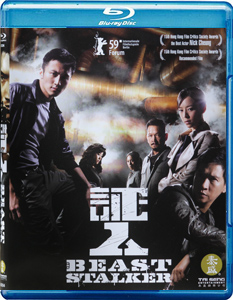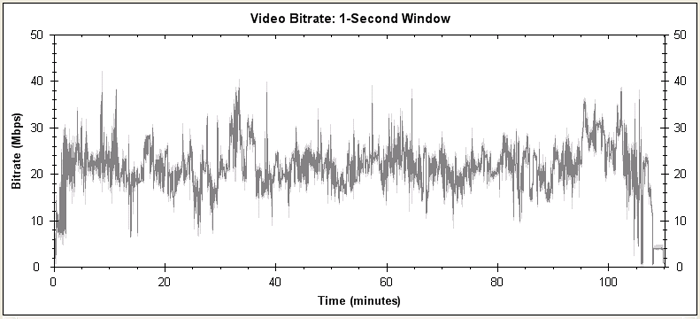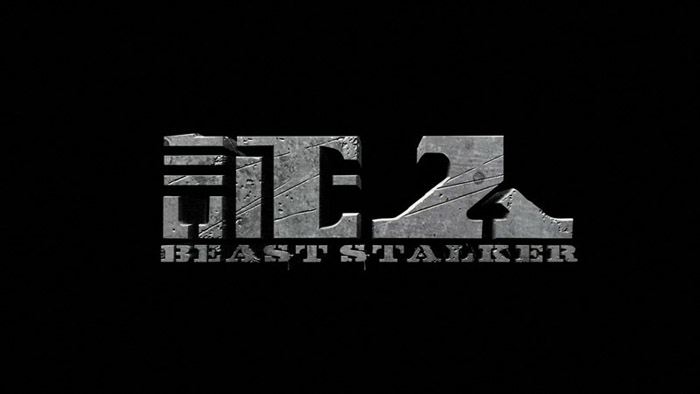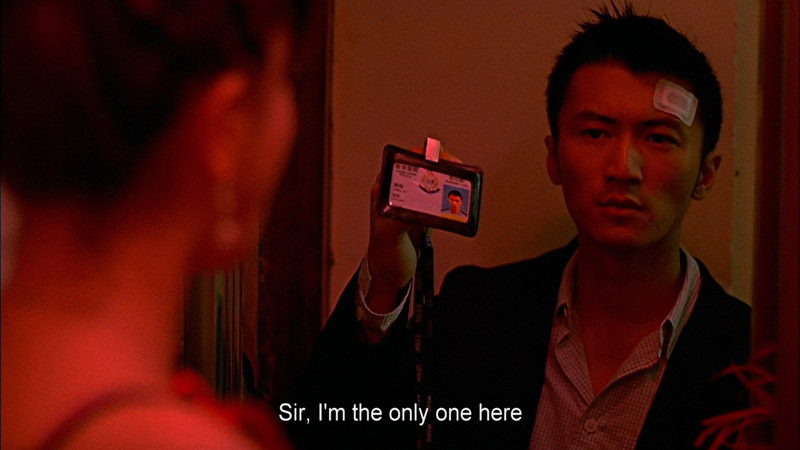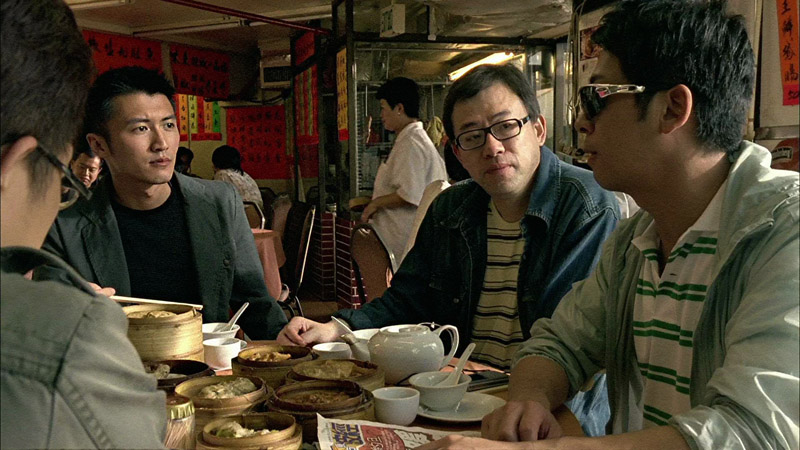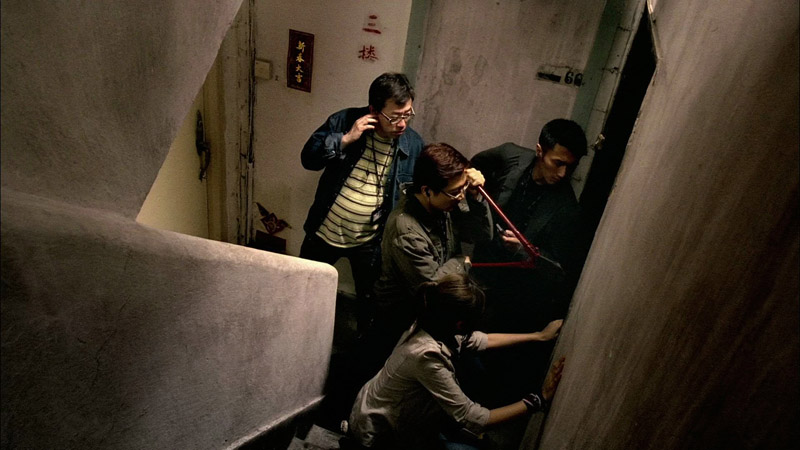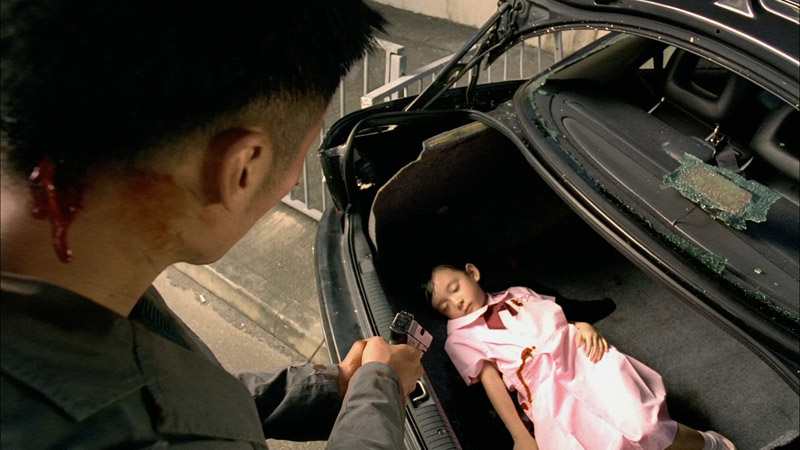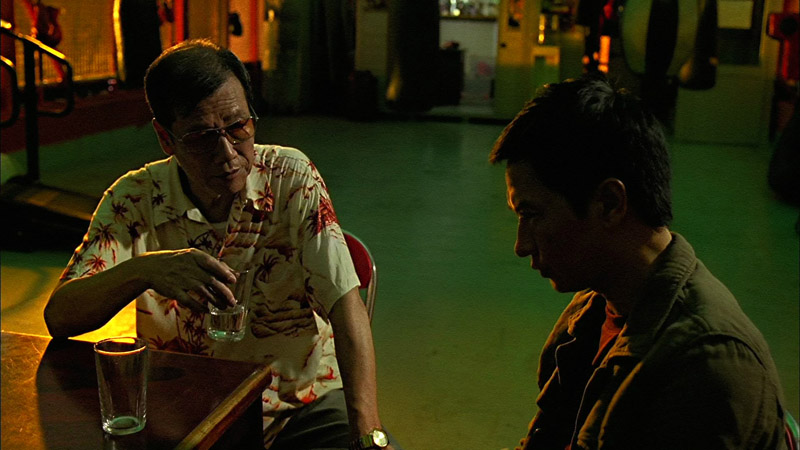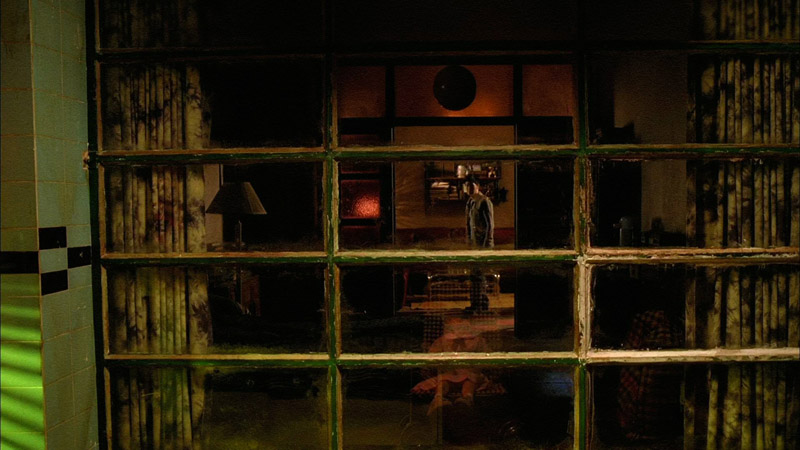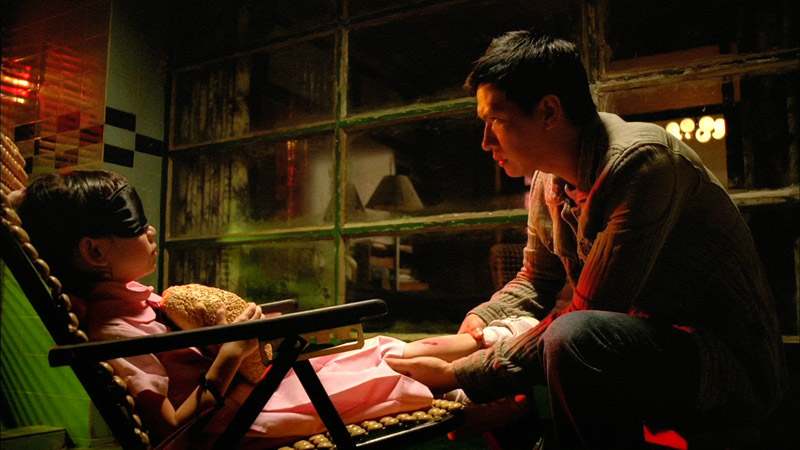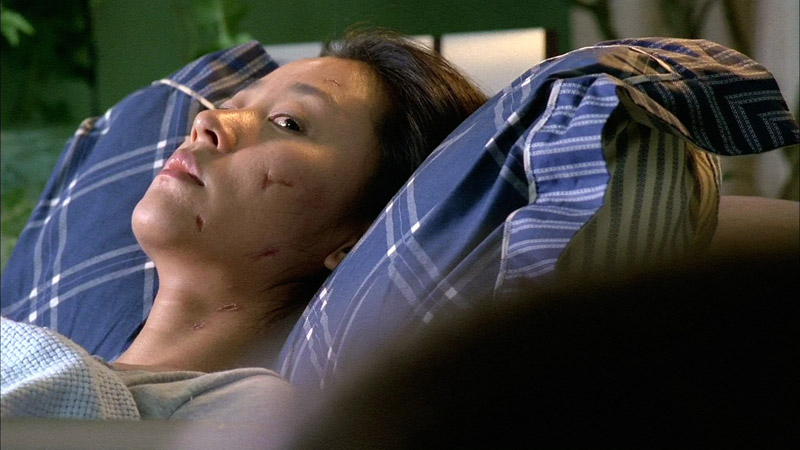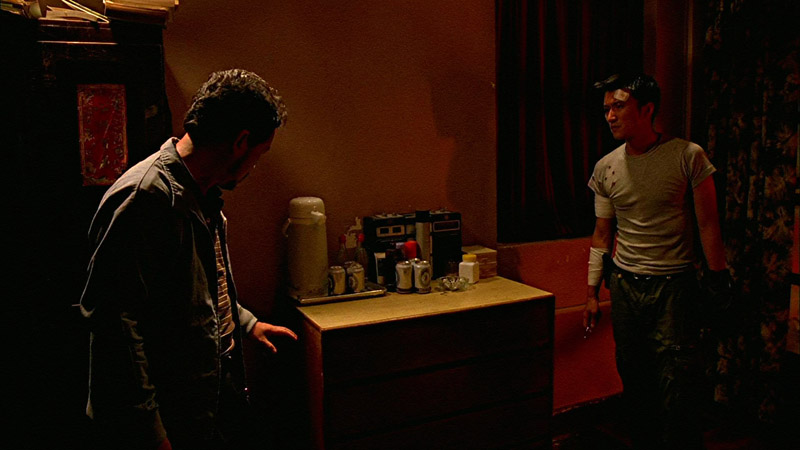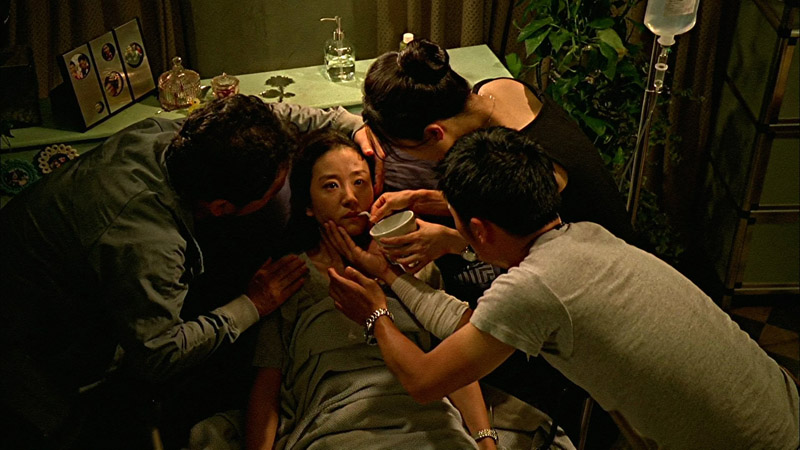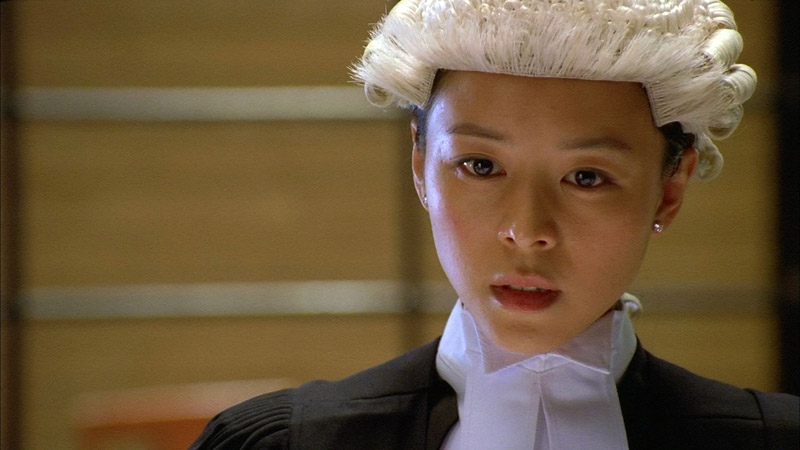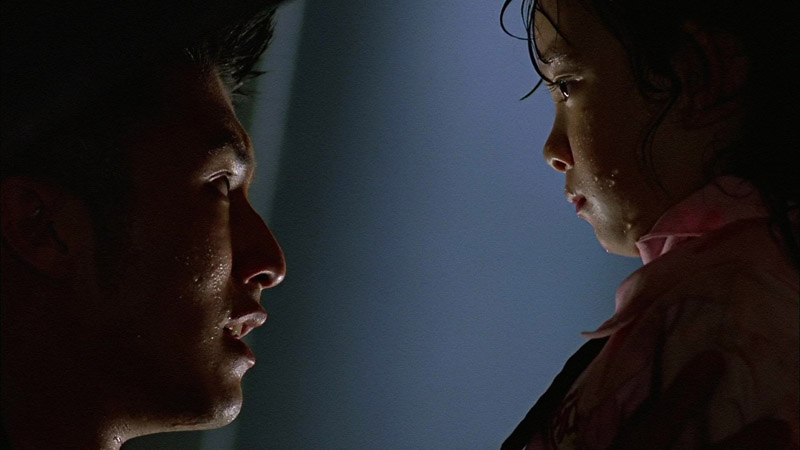Review by Leonard Norwitz
Studio:
Theatrical: Emperor Motion Pictures
Blu-ray: Tai Seng Entertainment (U.S.)
Disc:
Region: FREE!
(as verified by the
Momitsu region FREE Blu-ray player)
Runtime: 1:50:05.625
Disc Size: 24,062,560,740 bytes
Feature Size: 23,135,188,992 bytes
Video Bitrate: 21.44 Mbps
Chapters: 18
Case: Standard Blu-ray case
Release date: October 27th, 2009
Video:
Aspect ratio: 2.35:1
Resolution: 1080p / 24 fps
Video codec: MPEG-4 AVC Video
Bitrate:
Audio:
Dolby TrueHD Audio Chinese 1770 kbps 5.1 / 48 kHz / 1770
kbps / 16-bit (AC3 Core: 5.1 / 48 kHz / 640 kbps)
Dolby Digital Audio Chinese 640 kbps 5.1 / 48 kHz / 640 kbps
Dolby Digital Audio Chinese 640 kbps 5.1 / 48 kHz / 640 kbps
Dolby Digital Audio Chinese 224 kbps 2.0 / 48 kHz / 224 kbps
Subtitles:
English, Chinese (traditional and simplified), Malay, none
Extras:
• Commentary with Director Dante Lam, Screenwriter Jack Ng,
and Production Designer Yau Wai-Ming
The Film:
8
As Steve McQueen had his Blob and Raymond Burr his Godzilla
I guessed Beast Stalker was Nicholas Tse's and Nick Cheung's
chance to prove they could do schlock as well as the next
guy. In fact, I was very surprised by this movie. From the
title, which is the worst thing about Beast Stalker, the
film turned out to be a far cry from the
fantasy/horror/vampire née video game movie it predicted.
Nor is the "Beast" an totally unsympathetic character,
thanks largely to Cheung.
But I am getting ahead of the story, which begins with a
bust, during which one cop is hurt, a car chase and the
accidental shooting of a young girl by police team leader
Tong (Tse). Tong has quite the temper, as we witness after
the first melee. He angrily chews out one of his crew for
anticipating the "Go" command and possibly causing the
confusion that resulted in the injury to his colleague. But
in the moment, Tong's eagerness to use his weapon in chasing
down an important suspect, Cheung Yat-Tung (Keung Ho Man),
results in the shooting of the girl, who, inexplicably, is
found in the trunk of Cheung's car.
Even though her death is ruled "accidental" Tong is
mortified. He can't go on with his job and instead retreats
into a kind of purgatory. He stays close to Ling (Wong
Suet-yin), the twin sister of the dead girl, as if to await
some obscure opportunity for redemption. Her mother, as it
happens, is a prosecutor (Zhang Jingchu) whose present case
- the action is now three months past the death of her
daughter - is Cheung, the very suspect that Tong was
chasing. I can predict that it will be difficult for some
viewers not to get beyond the coincidences in this story,
but I see them as essential in a way that in a typical
American movie would be merely faux ironies in place of good
story writing. Beast Stalker isn't a stand in for reality,
after all, it's an allegory about the dark side of good
intentions.
Cheung is a major mobster who, even in custody, commands
considerable underworld support. His plan is to intimidate
Prosecutor Gao by having her daughter kidnapped. Enter: Hung
(Nick Cheung), an assassin, kidnapper and all around thug.
Hung has seen better days until not so long ago - his face
still shows the ravages of some recent devastation. Not
least in significance is one completely clouded eye and the
other rapidly deteriorating. Hung needs money not only for
his own medication, but for his wife, Li (Mainland actress
Miao Pu), bed-ridden and just this side of coma at home, she
is in far greater need. For Li, he will do anything.
Kidnapping a little girl? Not a problem. Killing her, if
necessary? Why not, if the price is right?
It turns out Hung is better at his work than Tong at his,
and little Ling is snatched in broad daylight right from
under his nose. Tong gives chase, but loses them, as the
noose around his own neck tightens visibly. The bulk of the
movie involves Tong's efforts at recovering Ling, which,
because he has burned so many bridges with his former crew,
he must try to manage without overt police help. More
significant is that Prosecutor Gao makes it painfully clear
to Tong that he is to do nothing, else risk being
responsible for the deaths of both her children.
It's a challenge to discuss this movie without giving away
certain plot elements that are best left for virgin
discovery – not that repeated viewings would be unwelcome.
But I can say this with a clear conscience: You know those
movies where "things are not as they seem," where, when we
learn this or that fact, usually in the final seconds of the
movie, we have to reevaluate our thinking about all that has
gone before? I have a particular dislike for these plots. I
find them a betrayal of the God of Creative Thinking. When
Hitchcock does this in Stage Fright we smile at the
subterfuge (I do, anyhow), but that was in 1950, and Hitch
is careful to create suspicion that our original historian
may not be telling the truth about things. But I digress. In
Beast Stalker the "reveals" as we call them, may come or may
not come as a surprise, but do not require one iota of
reevaluation. Instead, they deepen our understanding of
character motivation and tie up loose ends that we may have
forgotten about – or not, if we were paying attention.
Dante Lam is a director whose work I have not previously
seen, though I have heard good things about his 2000 Jiang
hu: The Triad Zone. Here he clearly is in control of his
medium, which is to indulge his artistic choices at the
service of the screenplay. There were times, especially with
his concentration of eyes and glass (that's "glass" not
"grass") that reminded me of Polanski's Chinatown – and you
can't get a better reference than that.
Image:
8/9
NOTE:
The below
Blu-ray
captures were taken directly from the
Blu-ray
disc.
The first number indicates a relative level of excellence
compared to other Blu-ray video discs on a ten-point scale.
The second number places this image along the full range of
DVD and Blu-ray discs.
Tai Seng has done well at transferring the natural
cityscapes, the deep greens and blood reds of Hung's lair,
and brilliant, natural flesh tones surrounding Prosecutor
Gao's usually clean world that make up the original
photography: Sharp (except for Nicholas Tse, who is often
made less distinct in various ways I assume to obscure his
natural good looks), well resolved, clear, with excellent
control contrast and shadows, yet retaining the grain of the
original. This is not one of those typical HK gangster
movies, like the recently reviewed Invisible Target for
example, where everything is polished to the point of
oversharpening. Nor is there that studio look we get by the
overuse of more light than could possibly have existed in
any given scene - even though there is plenty of opportunity
for artistic use of filtered light here. I found no
distracting transfer issues such as edge enhancement or DNR,
and the source print is without dirt or scratches. The
picture looks terrific on my 104 inch screen.
Audio & Music:
8/9
The Cantonese Dolby TrueHD 5.1 mix is far less over-the-top
than your typical HK cop movie (again, I have Invisible
Target in mind). Street sounds are more subtly mixed.
Passing traffic is nicely panned, but our attention is not
directed to it. In one extended sequence where Tong is on
the trail of a clue he hopes will lead him to Ling, he is
stuck on one street with no clear idea of how to proceed
while a persistent, muted pounding of heavy construction
equipment underscores the suspense. Elsewhere Henry Lai
provides ingenious counterpoint with acoustic guitars. It's
not an original idea, but surprisingly effective. His
scoring for the action sequences involves judicious use of
percussion blended perfectly into the effects mix. We are
grateful that car crashes, while visually enhanced for
stylistic and artistic reasons, lack the typical high
frequency exaggeration of broken glass.
Operations:
7
The Cantonese is translated into idiomatic English with few
spelling or grammatical mistakes. Yet it did bother me that
Tong's crew referred to him as "captain" when he was only a
sergeant and a simple "boss" would have suited him better.
The menu makes clear what languages and subtitles are
available – there's even one for the commentary.
Extras:
3
A sober and informative commentary with the director,
screenwriter and production designer, in Chinese with
optional English subtitles, accompanies the movie. Their
analysis is thoughtful and now again insightful but – my
only complaint – a little discontinuous. While they seem to
be reviewing their film without a script or notes, they are
engaged with each other in a kind of film school give and
take. This is the only Bonus Feature.
Bottom line:
9
I see maybe an Asian film a week, though I don't report on
all of them. While coming out of the Hong Kong
cops-and-gangsters genre, Beast Stalker has resonance with
some of Korea's best psychological thrillers, like Sympathy
for Mr. Vengeance or Memories of Murder. I'm not saying that
Beast Stalker is quite at that level of mind-bending
intensity, nor is it able to free itself entirely from
certain clichés of the genre, but it is closer to them than
your typical HK thriller. I should give special mention to
both Nick Cheung in a complex dramatic role where he does
not get to show off his martial arts, and Miao Pu, who
compellingly expresses herself with only her eyes, a muted
voice and the fingers of one hand. The image and audio are
both very good, and the commentary worth a listen – or, a
read. Enthusiastic Thumbs Up.
Leonard Norwitz
April 8th, 2010
![]()
![]()

![]()
![]()
![]()
![]()

![]()
![]()

